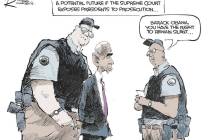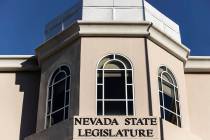Education cuts? Nevada’s destined for mediocrity
Cutting the state budget is difficult work, I'm sure. Even Republican Gov. Jim Gibbons and other "small government" types surely feel some pangs of unease about the grim task of gouging programs and projects designed to make Nevada a better place.
Obviously, Gibbons and his cohorts don't feel too bad about it, though, as they are proceeding apace, without giving any serious consideration to alternatives. It's full steam ahead, as Capt. Gibbons steers straight for the iceberg.
So, as you go about gutting the state budget, how do you decide what to cut and what to save? No doubt those are tough decisions. From Gibbons' perspective, "entitlement" programs must go first, so that means the poor and sick take the biggest hits. Never mind that as the economy falls, the need for social services rises.
Then, of course, there's education. From the perspective of many conservatives, public education is bloated and ineffective and could use a good trim no matter what's happening with the economy. But this perspective is more a reflection of partisan politics than of reality.
It's like this: Nevada's teachers have a union, a large and influential union that sometimes makes waves. Fiscal conservatives inherently don't like this sort of grumbling.
So, right from the start, public education is suspect. Then, because of the sheer size of the state's growing population, the percentage of the budget dedicated to education looks big. It's not really big -- Nevada severely underfunds education -- but it looks big in comparison with the amount of money going to other things.
Naturally, then, the schools are seen as having all kinds of cash lying around that they don't really need -- especially when a lot of that money is going into the pockets of those greedy teachers.
Most of the cuts strike me as ill-advised, but it's education that really stings. Nevada is making a huge mistake by giving short shrift to its educational systems. If, instead, we invested heavily in education, the results could have a dramatic, positive impact on the state's future.
What I find fascinating -- and horrifying -- about the budget-hackers is their derisive dismissal of "the future." When politicians and others express concern about the long-term effects of these cuts, they are met with a sneer.
The future, it seems, is a bugaboo, a stalking-horse, an excuse. According to this line of thinking, the future is unknowable, so why get so agitated about it? Or, alternatively, the future is knowable, and it's not going to be much different from the present or the past, so don't be such a naïve idealist.
Besides, the future is in the future, right? Let's worry about it later.
This is nonsense -- a bugaboo of another sort. It's shortsighted, nihilistic and, frankly, rather un-American.
The future is all we've got. It's the most important element of our political discourse. It's a rhetorical device, sure, but it represents a basic human desire for a better life, a better community, a better country -- the pursuit of happiness.
It's completely reasonable, I think, to want a better future for our kids and grandkids, and to pursue measures to make it happen. I will concede that in rare instances, doing nothing or even doing less actually may be the best course to a better future. But more often, doing something is more likely to produce a positive result. Previous generations embraced this approach, and thereby helped create many of the wonderful advantages we enjoy today.
To borrow a phrase from another context, we have not reached the "end of history." The United States is still a young country and Nevada is still a young state. We still have plenty of room to progress, improve, achieve.
However, this will not happen without robust schools.
UNLV -- the great hope for higher education in Southern Nevada -- is getting hit hard by Gibbons' cuts. Class offerings are being scaled back and faculty positions are being eliminated. As a result, class sizes will increase and less research will be done.
This is not a recipe for greatness; it is a recipe for mediocrity or worse. Among those who care about the well-being of this community, who finds this acceptable?
But wait -- that's just the first wave of Gibbons' cuts. University system Chancellor Jim Rogers recently bemoaned the possibility of having to eliminate entire academic programs or even colleges. In the alternative, or in conjunction, he said student fees may have to increase dramatically.
This, too, is a shockingly bad prospect. As we enter high school graduation week in Las Vegas, I can tell you with certainty that plenty of kids and their parents are facing difficulties figuring out how to afford college. The Millennium Scholarship program is a shadow of its former self, and although Nevada tuition remains relatively affordable by national standards, it's far from cheap.
What bothers me most about the budget-slashers is they seem so far removed from the goal of Nevada becoming a great state. Is that not our collective aspiration? For them, Nevada is merely a place to do business without strings, a low-tax haven for those who feel no obligation to participate in the greater good. Like mining companies, they want to extract what they can and move on when the vein has played out. It's a cold, narrow philosophy reflected in the popular view that if you don't have kids, you shouldn't have to pay for the schools.
Consider the irony: When the national media come to Nevada and write things that make us look bad, locals are outraged. How dare they criticize our wonderful state? But the truth is, we deserve it much of the time. We accept mediocre schools and highways. We sleep well knowing that our social and health services are barebones. We barely notice that our courts are overburdened, our prisons crowded, our regulatory agencies stretched thin.
Las Vegas Mayor Oscar Goodman, pondering a run for governor in 2010, recently put it like this. "If it costs to have a great society, then you have to say, 'It costs.' You can't say you're going to get something for nothing."
Geoff Schumacher (gschumacher@reviewjournal.com) is publisher of Las Vegas CityLife, an alternative newsweekly owned by the same company as the Review-Journal. He also is the author of "Sun, Sin & Suburbia: An Essential History of Modern Las Vegas" and "Howard Hughes: Power, Paranoia & Palace Intrigue." His column appears Sunday.























